Yuewen Sun
Beyond the Black Box: Identifiable Interpretation and Control in Generative Models via Causal Minimality
Dec 11, 2025Abstract:Deep generative models, while revolutionizing fields like image and text generation, largely operate as opaque black boxes, hindering human understanding, control, and alignment. While methods like sparse autoencoders (SAEs) show remarkable empirical success, they often lack theoretical guarantees, risking subjective insights. Our primary objective is to establish a principled foundation for interpretable generative models. We demonstrate that the principle of causal minimality -- favoring the simplest causal explanation -- can endow the latent representations of diffusion vision and autoregressive language models with clear causal interpretation and robust, component-wise identifiable control. We introduce a novel theoretical framework for hierarchical selection models, where higher-level concepts emerge from the constrained composition of lower-level variables, better capturing the complex dependencies in data generation. Under theoretically derived minimality conditions (manifesting as sparsity or compression constraints), we show that learned representations can be equivalent to the true latent variables of the data-generating process. Empirically, applying these constraints to leading generative models allows us to extract their innate hierarchical concept graphs, offering fresh insights into their internal knowledge organization. Furthermore, these causally grounded concepts serve as levers for fine-grained model steering, paving the way for transparent, reliable systems.
Causal Discovery and Counterfactual Reasoning to Optimize Persuasive Dialogue Policies
Mar 19, 2025Abstract:Tailoring persuasive conversations to users leads to more effective persuasion. However, existing dialogue systems often struggle to adapt to dynamically evolving user states. This paper presents a novel method that leverages causal discovery and counterfactual reasoning for optimizing system persuasion capability and outcomes. We employ the Greedy Relaxation of the Sparsest Permutation (GRaSP) algorithm to identify causal relationships between user and system utterance strategies, treating user strategies as states and system strategies as actions. GRaSP identifies user strategies as causal factors influencing system responses, which inform Bidirectional Conditional Generative Adversarial Networks (BiCoGAN) in generating counterfactual utterances for the system. Subsequently, we use the Dueling Double Deep Q-Network (D3QN) model to utilize counterfactual data to determine the best policy for selecting system utterances. Our experiments with the PersuasionForGood dataset show measurable improvements in persuasion outcomes using our approach over baseline methods. The observed increase in cumulative rewards and Q-values highlights the effectiveness of causal discovery in enhancing counterfactual reasoning and optimizing reinforcement learning policies for online dialogue systems.
Causal Representation Learning from Multimodal Biological Observations
Nov 10, 2024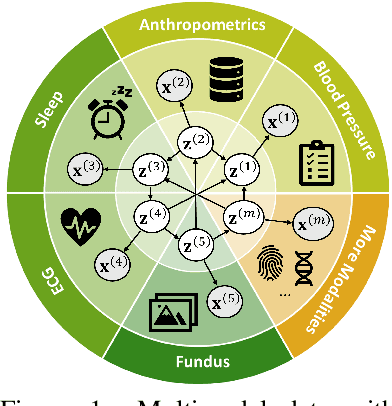

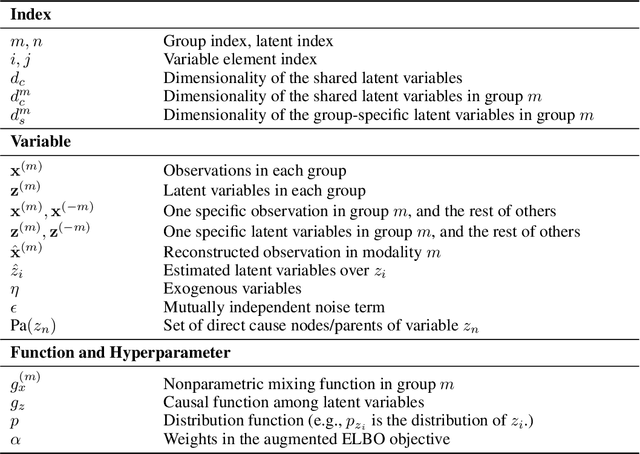
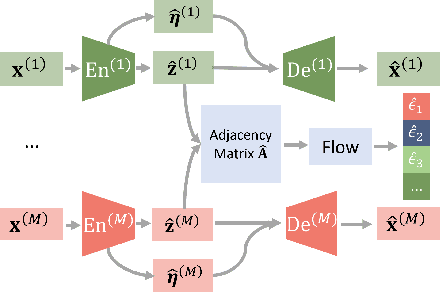
Abstract:Prevalent in biological applications (e.g., human phenotype measurements), multimodal datasets can provide valuable insights into the underlying biological mechanisms. However, current machine learning models designed to analyze such datasets still lack interpretability and theoretical guarantees, which are essential to biological applications. Recent advances in causal representation learning have shown promise in uncovering the interpretable latent causal variables with formal theoretical certificates. Unfortunately, existing works for multimodal distributions either rely on restrictive parametric assumptions or provide rather coarse identification results, limiting their applicability to biological research which favors a detailed understanding of the mechanisms. In this work, we aim to develop flexible identification conditions for multimodal data and principled methods to facilitate the understanding of biological datasets. Theoretically, we consider a flexible nonparametric latent distribution (c.f., parametric assumptions in prior work) permitting causal relationships across potentially different modalities. We establish identifiability guarantees for each latent component, extending the subspace identification results from prior work. Our key theoretical ingredient is the structural sparsity of the causal connections among distinct modalities, which, as we will discuss, is natural for a large collection of biological systems. Empirically, we propose a practical framework to instantiate our theoretical insights. We demonstrate the effectiveness of our approach through extensive experiments on both numerical and synthetic datasets. Results on a real-world human phenotype dataset are consistent with established medical research, validating our theoretical and methodological framework.
On the Parameter Identifiability of Partially Observed Linear Causal Models
Jul 24, 2024



Abstract:Linear causal models are important tools for modeling causal dependencies and yet in practice, only a subset of the variables can be observed. In this paper, we examine the parameter identifiability of these models by investigating whether the edge coefficients can be recovered given the causal structure and partially observed data. Our setting is more general than that of prior research - we allow all variables, including both observed and latent ones, to be flexibly related, and we consider the coefficients of all edges, whereas most existing works focus only on the edges between observed variables. Theoretically, we identify three types of indeterminacy for the parameters in partially observed linear causal models. We then provide graphical conditions that are sufficient for all parameters to be identifiable and show that some of them are provably necessary. Methodologically, we propose a novel likelihood-based parameter estimation method that addresses the variance indeterminacy of latent variables in a specific way and can asymptotically recover the underlying parameters up to trivial indeterminacy. Empirical studies on both synthetic and real-world datasets validate our identifiability theory and the effectiveness of the proposed method in the finite-sample regime.
Counterfactual Reasoning Using Predicted Latent Personality Dimensions for Optimizing Persuasion Outcome
Apr 21, 2024Abstract:Customizing persuasive conversations related to the outcome of interest for specific users achieves better persuasion results. However, existing persuasive conversation systems rely on persuasive strategies and encounter challenges in dynamically adjusting dialogues to suit the evolving states of individual users during interactions. This limitation restricts the system's ability to deliver flexible or dynamic conversations and achieve suboptimal persuasion outcomes. In this paper, we present a novel approach that tracks a user's latent personality dimensions (LPDs) during ongoing persuasion conversation and generates tailored counterfactual utterances based on these LPDs to optimize the overall persuasion outcome. In particular, our proposed method leverages a Bi-directional Generative Adversarial Network (BiCoGAN) in tandem with a Dialogue-based Personality Prediction Regression (DPPR) model to generate counterfactual data. This enables the system to formulate alternative persuasive utterances that are more suited to the user. Subsequently, we utilize the D3QN model to learn policies for optimized selection of system utterances on counterfactual data. Experimental results we obtained from using the PersuasionForGood dataset demonstrate the superiority of our approach over the existing method, BiCoGAN. The cumulative rewards and Q-values produced by our method surpass ground truth benchmarks, showcasing the efficacy of employing counterfactual reasoning and LPDs to optimize reinforcement learning policy in online interactions.
CaRiNG: Learning Temporal Causal Representation under Non-Invertible Generation Process
Jan 25, 2024



Abstract:Identifying the underlying time-delayed latent causal processes in sequential data is vital for grasping temporal dynamics and making downstream reasoning. While some recent methods can robustly identify these latent causal variables, they rely on strict assumptions about the invertible generation process from latent variables to observed data. However, these assumptions are often hard to satisfy in real-world applications containing information loss. For instance, the visual perception process translates a 3D space into 2D images, or the phenomenon of persistence of vision incorporates historical data into current perceptions. To address this challenge, we establish an identifiability theory that allows for the recovery of independent latent components even when they come from a nonlinear and non-invertible mix. Using this theory as a foundation, we propose a principled approach, CaRiNG, to learn the CAusal RepresentatIon of Non-invertible Generative temporal data with identifiability guarantees. Specifically, we utilize temporal context to recover lost latent information and apply the conditions in our theory to guide the training process. Through experiments conducted on synthetic datasets, we validate that our CaRiNG method reliably identifies the causal process, even when the generation process is non-invertible. Moreover, we demonstrate that our approach considerably improves temporal understanding and reasoning in practical applications.
Deep Radon Prior: A Fully Unsupervised Framework for Sparse-View CT Reconstruction
Dec 30, 2023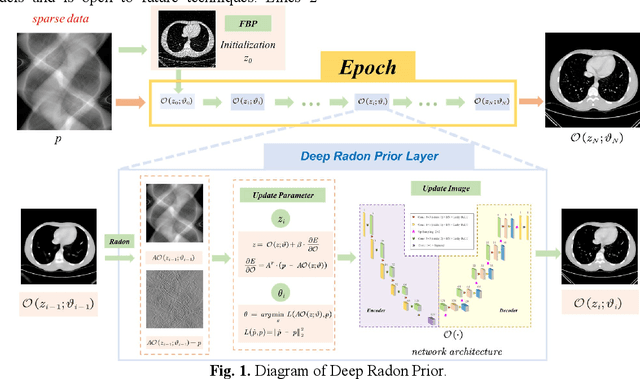
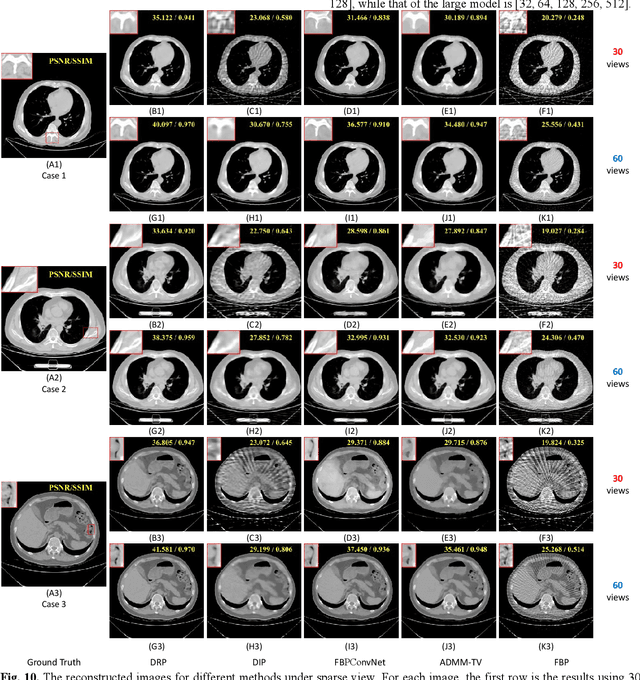

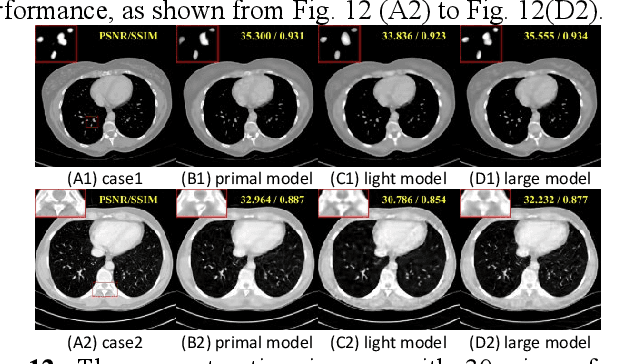
Abstract:Although sparse-view computed tomography (CT) has significantly reduced radiation dose, it also introduces severe artifacts which degrade the image quality. In recent years, deep learning-based methods for inverse problems have made remarkable progress and have become increasingly popular in CT reconstruction. However, most of these methods suffer several limitations: dependence on high-quality training data, weak interpretability, etc. In this study, we propose a fully unsupervised framework called Deep Radon Prior (DRP), inspired by Deep Image Prior (DIP), to address the aforementioned limitations. DRP introduces a neural network as an implicit prior into the iterative method, thereby realizing cross-domain gradient feedback. During the reconstruction process, the neural network is progressively optimized in multiple stages to narrow the solution space in radon domain for the under-constrained imaging protocol, and the convergence of the proposed method has been discussed in this work. Compared with the popular pre-trained method, the proposed framework requires no dataset and exhibits superior interpretability and generalization ability. The experimental results demonstrate that the proposed method can generate detailed images while effectively suppressing image artifacts.Meanwhile, DRP achieves comparable or better performance than the supervised methods.
Learning Temporally Causal Latent Processes from General Temporal Data
Oct 11, 2021



Abstract:Our goal is to recover time-delayed latent causal variables and identify their relations from measured temporal data. Estimating causally-related latent variables from observations is particularly challenging as the latent variables are not uniquely recoverable in the most general case. In this work, we consider both a nonparametric, nonstationary setting and a parametric setting for the latent processes and propose two provable conditions under which temporally causal latent processes can be identified from their nonlinear mixtures. We propose LEAP, a theoretically-grounded architecture that extends Variational Autoencoders (VAEs) by enforcing our conditions through proper constraints in causal process prior. Experimental results on various data sets demonstrate that temporally causal latent processes are reliably identified from observed variables under different dependency structures and that our approach considerably outperforms baselines that do not leverage history or nonstationarity information. This is one of the first works that successfully recover time-delayed latent processes from nonlinear mixtures without using sparsity or minimality assumptions.
 Add to Chrome
Add to Chrome Add to Firefox
Add to Firefox Add to Edge
Add to Edge